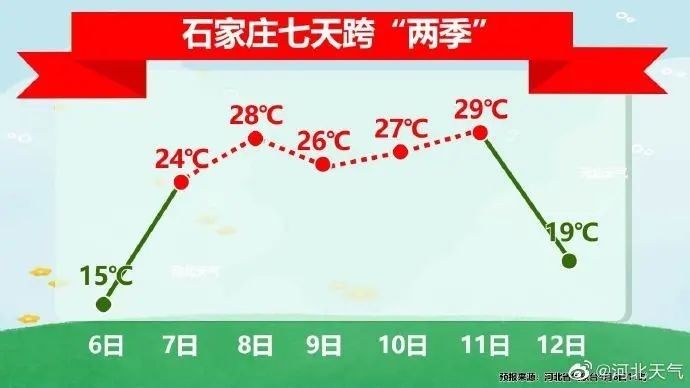Shijiazhuang staged a seven-day spanning “two seasons”
Shijiazhuang from the 6th to the 12th
Seven days spanning “two seasons”

The temperature fluctuates greatly, how to improve immunity?
The temperature changes greatly, which can easily lead to colds. It is very important to improve immunity. The adjustment of diet and the cultivation of some good habits in daily life can help to improve immunity. Let’s see how experts do it. Say?
It is very important to hydrate the body and there are tricks to drinking water every day
Water is an important component of the human body, accounting for about 60% to 70% of a healthy adult’s body weight. Water participates in the metabolism of the human body, not only assisting in the transport of nutrients in the body, but also in helping to excrete wastes produced by the body such as urine and feces. Water also has the effect of regulating body temperature. When the temperature is high, it can reduce body temperature by evaporating water. Water can play a lubricating role, such as the water in the joints, thoracic cavity, abdominal cavity and gastrointestinal tract of the human body, and play a lubricating and buffering protective effect on the joints, organs and muscles of these parts. It is recommended that adults drink 7-8 glasses of water a day (about 1500-1700 ml in total), and drinking boiled water or tea is recommended.
Diversified food types, rich and comprehensive nutrition
A long-term adherence to a reasonable diet, ensuring three meals a day and eating on time, is one of the important guarantee conditions for the body’s physiological and immune functions. Only a variety of foods can meet the human body’s needs for energy and various nutrients. It is recommended that Chinese residents should consume at least 12 kinds of food per day and at least 25 kinds of food per week, and the daily diet should include cereals, potatoes, vegetables and fruits as much as possible. , livestock, poultry, fish, eggs, milk, soybean nuts and other types of food.
Protein is an important part of the human body, and 70% of the solid content in human cells is protein. Fish and shrimp, poultry, lean pork, beef and mutton, eggs, soybeans and soy products, and milk are all good sources of high-quality protein. The various amino acid types and ratios contained in high-quality protein are closer to the protein amino acid composition in the human body, and are easy to be digested and absorbed by the human body. Therefore, it is necessary to appropriately increase the intake of foods rich in high-quality protein according to age, gender and health status.
In addition, fresh vegetables and fruits are a great source of vitamins, minerals, dietary fiber and many phytochemicals. Among them, B vitamins, vitamin C, vitamin E and other nutrients have strong antioxidant and immune regulation effects. According to the recommendation of the “Dietary Guidelines for Chinese Residents (2016)”, under normal circumstances, adults should consume about one pound of fresh vegetables and half a pound of fresh fruits every day. The more types, the better. Dark green, red, orange and purple vegetables, because they are rich in beta-carotene, are the main source of our daily dietary vitamin A, also known as dark vegetables, and it is recommended to account for half of the intake.
Nutritional fortification is required for people with special circumstances
For children who cannot eat well, it is recommended to choose a single or compound containing vitamin A, vitamin D, vitamin C, vitamin B1, B2, B6, Nutrient supplements for iron, zinc, selenium, and DHA; for pregnant women and postpartum lactating mothers, single or multi-nutrient supplements or formula milk powder can be selected for supplementation when a diversified diet cannot be obtained to achieve a balanced diet; calcium intake in food Insufficient intake, insufficient sunshine or the elderly need additional calcium and vitamin D preparations.
Under normal circumstances, the nutrients needed by the human body should be obtained from food as much as possible through a balanced diet. However, for individuals with nutrient deficiencies, corresponding dietary improvement measures can be taken, and nutrient supplements and fortified foods can be scientifically selected as sources of nutrient supplements to make up for deficiencies and improve nutrient deficiencies.